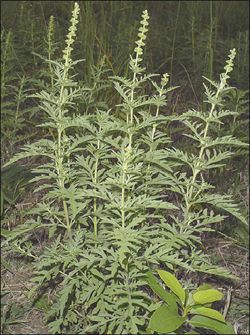Common Ragweed
What is Ragweed?
- An annual broadleaf weed that produces allergenic pollen
- Ragweed blooms in late summer to early fall
- Each plant produces about a billion pollen grains per season
- With the help of the wind, ragweed can travel distances greater than 200 kilometres
- Ragweed has a jagged leaf and tannish-green flower stalks
- It can grow to a height of anywhere from 1 - 6 feet

Common ragweed
Where is Ragweed found?
You can find ragweed all over Southern Ontario, often growing with a plant called goldenrod. Goldenrod pollen is not carried on the wind like ragweed pollen.
You can find ragweed in:
- Gardens
- Poorly kept lawns
- Sidewalk edges
- Fence-lines
- Along roadsides
How can Ragweed affect my health?
Ragweed can cause a number of health problems for some people:
- Hay fever, which includes sneezing, runny nose, and itchy eyes
- A skin rash (allergic contact dermatitis)
- Coughing and wheezing
- Scratchy and irritated throat
- Headaches
- Difficulty sleeping
Are there Ragweed By-laws in Halton?
The Provincial Weed Control Act (R.R.O. 1990, Reg. 1096) requires land owners to destroy ragweed.
| Milton | No By-law |
| Oakville | No By-law |
| Halton Hills | Included as a “nuisance weed” requiring removal under Community Standards By-law No. 2008-0138 |
| Burlington | Require removal of weeds (including ragweed) from May 1 to October 15 each year. By-law No. 12-2011 |
Does the Ontario Pesticides Ban permit municipalities to spray Ragweed?
Yes, the Ontario Pesticides Ban (external link) contains exceptions to certain plants to protect public health and safety.
How can I get rid of Ragweed?
Since ragweed spreads by seed, eliminating this weed should focus on preventing seed production. We recommend hand-pulling the ragweed as the plants are easy to pull out with their shallow root systems. We recommend using gloves.
What can I do to protect my health?
Use the following precautionary measures to reduce exposure:
- Minimize outdoor activities when pollen count is highest (10 a.m.- 4 p.m.)
- Monitor local weather report for local pollen counts
- Keep windows closed and use air conditioning at home and in the car
- Mow your grass often and wear a dust/pollen mask while you mow
- Wear wraparound sunglasses to prevent pollen from blowing into your eyes
- Avoid places with lots of weeds and tall grasses, like parks or fields
- Clean your furnace/air-conditioner filter frequently
How can I treat my allergies?
If you experience an allergic reaction, speak to your doctor about over-the-counter or prescription medications to help control your symptoms.

